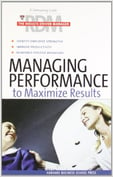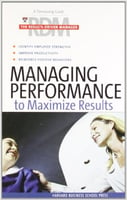I am currently reading a terrific book by Harvard Business School Press called "Managing...
Managing Performance to Maximize Results - Part 2

This is the second article in a series inspired by a book published by Harvard Business School Press called "Managing Performance to Maximize Results". It is a compilation of articles, all based around Human Resources Performance Management - and in many cases the ideas and practical examples have direct parallels in the area of Strategic Relationship Management.
What we all hate to do!!!
One of the most difficult aspects of Relationship Management is how to tackle poor performance. Faced with an uncomfortable situation, people often simply gloss over the problems.
In a client-supplier relationship this can lead to 'churn' which in many cases comes completely out of the blue because underlying issues have never been surfaced and discussed, yet alone resolved.
Fix or Fire
When a significant issues has been identified, perhaps the first decision is whether you actually believe that the agency / supplier can improve? And secondly, you want an ongoing relationship with them. If you do then the next step is to engage with the agency / supplier to address the issues that you have identified. And at this point you need to invest to fix the relationship.
So here are three tips we have gleaned from the Human Resources space that can help in managing relationships with your few key suppliers.
1. Be Direct
The first element is to make sure that you clearly, explicitly communicate that the supplier's performance does not meet your expectations.
At the same time you should ensure that you also communicate that you do hold out hope for an improved performance. The fact that the discussion is being held is evidence of your commitment to fixing performance and continuing the relationship.2. Be Specific
Address the specific issues. Detail exactly what is wrong. And how you think it could be fixed. And consider this, what resources are you prepared to mobilize to help fix it?
This element of the action or development plan has been mentioned in many previous Blog articles. Without a commitment to address issues, the entire process is merely performance evaluation, rather than performance management.3. Be Objective
Do not attack the team or personality in any way. Be sure to stick to as factual an account as possible. it needs to be about observable events, not hearsay.
Try to maintain an objective eye and ensure that in no way does it degenerate into any form of personal attack.
You may find that keeping these three points in mind will help keep a focus on the future of the relationship and not allow it to degenerate into a historical beat up session.




